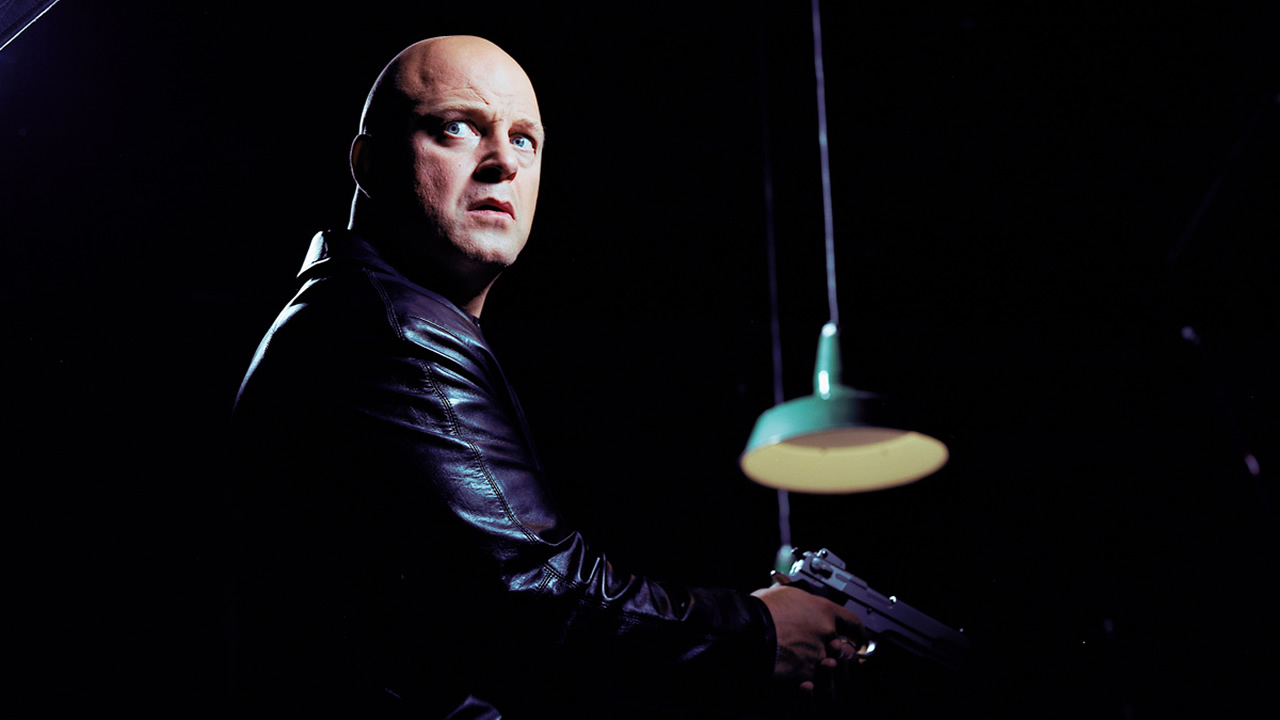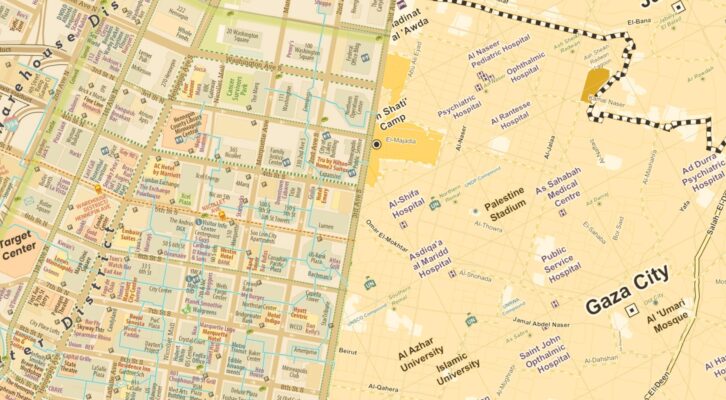The antihero in fiction has been around for centuries, gaining cultural prominence in post-World War II film noir classics such as Double Indemnity and Kiss Me Deadly and capturing the movie zeitgeist over the decades with The Godfather, Raging Bull, Mad Max, and Scarface. Antiheroes began to dominate prestige television in the 1990s with characters that were not always likable or even particularly heroic and constantly towed the line between good and evil. But despite the antihero’s flaws, when push came to shove, they tended to land on the side of good—or at least the side of less evil. Prestige television has featured many memorable antiheroes: Andy Sipowicz (NYPD Blue), Tony Soprano (The Sopranos), John Luther (Luther), Don Draper (Mad Men), Walter White (Breaking Bad), and Elizabeth Jennings (The Americans) to name a few. Yet in the brilliant, award-winning TV crime series The Shield, Vic Mackey took the trope of the antihero, doused it with gasoline, and set it on fire.
Vic Mackey (played with bullheaded brio by Michael Chiklis) is a detective in Farmington, CA, a city overrun by gang violence: there are more gangs in Farmington than characters in Game of Thrones. Farmington’s citizens, largely Black and Hispanic, live in near-poverty and are understandably distrustful of the predominantly white police force that has been more preoccupied with covering their asses than cleaning the streets.
Mackey heads up the Strike Team, a testosterone-drenched special unit assigned to gang patrol that operates on just the right side of the law (they even hand out business cards picturing a snake eating a rat). Initially the Strike Team consists of Vic Mackey, the hardheaded yet strategic leader, Shane Vendrell, impulsive and racist, yet loyal to a fault (played with both cocksure swagger and childlike insecurity by the fantastic Walton Goggins), Ronnie Gardocki, mustachioed and enigmatic, and Curtis Lemansky, do-gooder arm-wrestling champ and the team’s conscience—think Captain America with a shotgun. The Strike Team frequently uses violent, illegal methods to keep the peace, while siphoning drugs and cash from their busts to either squirrel away or barter with other gangs. Politically ambitious police Captain David Aceveda (the slickly charming Benito Martinez) tends to look the other way because, well, the ends justify the means. Mackey might barbecue a gang leader’s face on an electric grill, or beat a suspect with a phone book, but the information the suspect gives up saves the life of a young girl. The Strike Team’s brutal methods are a hard pill for the cops and politicians in Farmington to swallow. But they do swallow it.
***
In the very first episode of The Shield, the Strike Team, with newly-appointed team member Detective Terry Crowley, infiltrates the home of a gang member named Two-Time. During the chaos, Two-Time is shot and killed by Mackey and Vendrell. Mackey then takes Two-Time’s gun, calmly turns around, and shoots Detective Crowley in the face. Yes, the hero of The Shield murders another cop in cold blood in the very first episode of the series. Terry Crowley was not a bad cop. He wasn’t on the take or corrupt. Crowley’s only sin is that he was a mole, assigned to the Strike Team by Captain Aceveda due to his suspicion that Mackey has been providing protection for gang members. So let’s be clear: Vic Mackey murders another cop for no reason other than to protect his own ass.
 Michael Chiklis as Vin Mackey in The Shield (FX)
Michael Chiklis as Vin Mackey in The Shield (FX)
Created by former Nash Bridges and Angel writer Shawn Ryan, The Shield was inspired by the infamous Rampart scandal of the late 1990s in which over 70 LAPD officers in the CRASH anti-gang unit were implicated in one of the largest cases of police corruption in the country’s history. Early advertising for The Shield even referred to it as Rampart, and the CRASH unit clearly influenced the creation of the Strike Team.
Also in the 1990s and early 2000s, antiheroes began to dominate televised crime dramas. On NYPD Blue, Andy Sipowicz was your drunk, racist uncle, with a badge. Tony Soprano was a homicidal mobster, yet his devotion to his children and self-discovery through therapy made him oddly relatable. The Wire’s Jimmy McNulty wasn’t above totaling his car on a drunken bender or inventing a serial killer to push Baltimore to spend more on its gutted police force.
Though Mackey’s relationships in The Shield are nearly always transactional, he has his virtues, notably in coming to the aid of mistreated women. Mackey risks his life to help an informant/prostitute try to go clean and becomes the de facto guardian for a battered women’s shelter. He also has two autistic children who require constant care and attention, and the money he steals largely goes to pay for their education. These traits allow the viewer to not just root for but to relate to Mackey. Wouldn’t you do anything to give your special needs children every opportunity? Wouldn’t you want to protect at-risk women? So what if it means breaking a few eggs—or skulls—to make an omelet?
Through some magical alchemy it makes us care about a man who would shoot an innocent cop in the face, then spends the better part of seven seasons running from what became known in Shield lore as the Original Sin.This is the beauty of The Shield. Through some magical alchemy it makes us care about a man who would shoot an innocent cop in the face, then spends the better part of seven seasons running from what became known in Shield lore as the Original Sin. Much of that alchemy came from Chiklis as Vic Mackey. Prior to The Shield debuting in 2002, Chiklis was best known as Steve Pocatello, the awful houseguest on Seinfeld, and Tony Scali, the frumpy protagonist of The Commish. But in The Shield, Chiklis was a wrecking ball. Gleaming bald and newly buff—leather jackets and tight black t-shirts are Mackey’s uniform of choice—he is intimidating and vicious, yet charismatic and even vulnerable. Chiklis won a Golden Globe in 2003 for his portrayal of Vic Mackey, shockingly defeating Martin Sheen, Peter Krause, Kiefer Sutherland, and even Tony Soprano himself, the great James Gandolfini. Mackey’s confidence makes him the most popular cop at the precinct, the guy you want to toss a few back with after work, but also the one guy you do not want to cross. Because if you do, and you’re a closeted gay man like Officer Julien Lowe, who threatens to report Mackey after witnessing him steal cocaine from a crime scene, Mackey will blackmail you into silence. Yes, our hero threatens to out a gay officer in order to avoid being charged with drug theft. (In a tragic turn, Michael Jace, the actor who played Julien Lowe, was sentenced to 40 years in prison in 2016 for the murder of his wife.)
But even though Vic Mackey is a dirty cop, he is also the lynchpin that keeps Farmington from descending into total chaos. Like Tony Soprano, Mackey is a master politician and manipulator who understands better than anyone how to expertly leverage both fear and loyalty. To Vic, his crimes are a necessary evil that keep Farmington from anarchy. Yes, he provides protection for gangsters, but doing so prevents a bloody turf war that would put innocent lives at risk. Farmington has politicians and police chiefs, sure, but Vic Mackey is the most powerful man in the city. Get on his good side, and he can pad the stats to help you get elected to office. Get on his bad side and you’ll find out the hard way that he has enough dirt on you to send you to prison—or worse.
***
The Shield and The Wire interestingly premiered within months of each other in 2002 and can be viewed as flip sides of the same coin. The Wire offers a macro view of a corrupt city, Baltimore, abandoning its citizens from the top down, with self-serving politicians hobbling education and law enforcement policies together with little money to spend on either. The Shield takes a micro view of how one man corrupts his city from the bottom up, with Mackey’s rotten influence poisoning both Farmington’s law enforcement and underworld.
Like the Sopranos and Breaking Bad, The Shield is at its heart about family. The Strike Team is a brotherhood, their loyalty to each other taking priority over all else—often their own blood. And Mackey, the team’s paterfamilias, will do anything for his kids, even if it means covering up Vendrell’s racially-charged beating of a fellow cop. Detectives Holland “Dutch” Wagonbach, brilliant yet socially awkward, and Claudette Wyms, a dedicated Black detective who rose through the ranks when there were few African Americans on the force, forge an uneasy alliance at first, but eventually come to rely on each other. Vic’s wife, Corrine, is played by creator Shawn Ryan’s real-life spouse Cathy Cahlin Ryan, and his eldest daughter, Cassidy, is played by Michael Chiklis’s real-life daughter Autumn (now an author in her own right).
Like the Sopranos and Breaking Bad, The Shield is at its heart about family.The Mackey/Vendrell relationship is the centerpiece of The Shield: Vic is Shane’s surrogate father, and Shane’s arrogance is cover for his insecurity and neediness. In one unforgettable scene, Shane visits Vic in the hospital as he recovers from a bullet wound. Vic, heavily drugged, promises to take Shane golfing once he’s on his feet. Shane nearly breaks down in tears. Shane desperately wants to follow in his surrogate father’s footsteps—but he doesn’t have Mackey’s intellect, foresight, or patience. And as Shane gradually becomes a Frankenstein of Vic’s own creation, the full, operatic tragedy of The Shield takes form.
For seven seasons, The Shield more than held its own against two of the greatest crime shows of all time in The Sopranos and The Wire. Gritty and riveting, brutal yet heartwrenching, Vic Mackey’s corrupt soul eventually poisons everything around him, tearing lives and families apart as even he begins to realize the full, terrible scope of his actions, all leading to perhaps the greatest series finale in television history. In the final episodes of The Sopranos and Breaking Bad, the suspense is primarily driven by the question: “will Tony/Walter die?” But The Shield had something far more complicated, and far more harrowing, in mind. In the end, The Shield was never about whether Vic Mackey would live or die, but about the terrible legacy he created. Without Vic Mackey showing just how much the “hero” of a story could push the envelope, there may not have been a Walter White. The Shield holds up to this day as one of the greatest—and most influential—television shows of all time.

















